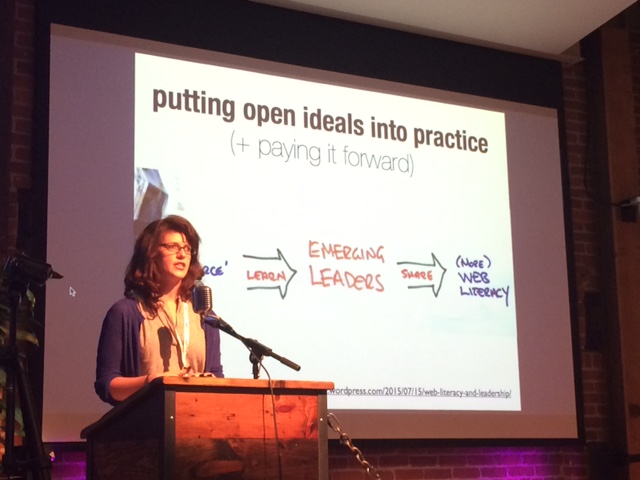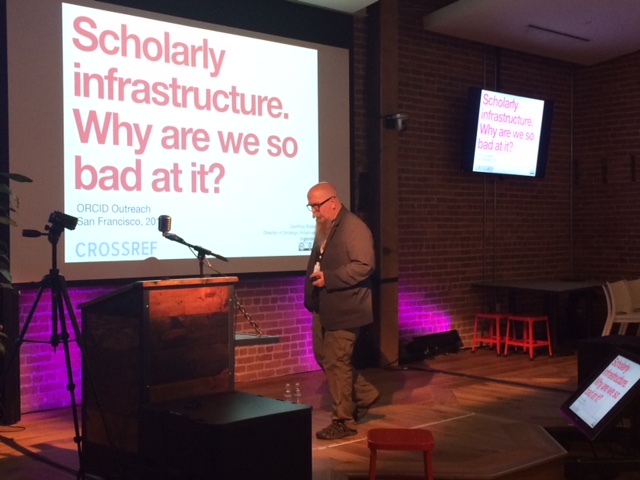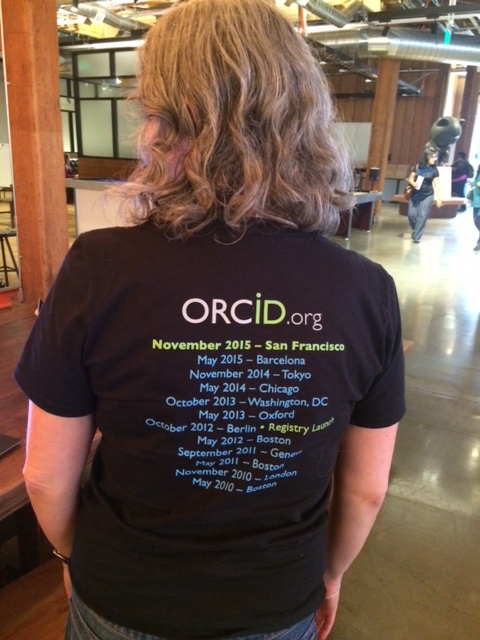Our November Outreach meeting in San Francisco brought together around 100 people across the scholarly community who create and use research information systems. Thanks to the generosity of our host, Github, we were able to take advantage of their open salon venue and design the meeting to enable participant interaction and focus on strategy – a bit of a departure from our tactical approach in previous outreach meetings. We largely banned formal presentations backed up by slides, and instead facilitated discussions, showcased lightning demos, used a twitter hashtag (#orcidtodo) to flag feedback and actions for ORCID, and hosted open support hours and a Codefest. Many thanks to everyone who helped make #ORCID15 a success – speakers, facilitators, Codefesters, attendees, and all of you who followed along on Twitter – you can see some of our favorite tweets in this Storify.
Our opening and closing keynotes were inspirational and provided excellent bookends to the event.
 Kaitlin Thaney of Mozilla Science Labs discussed Shifting Scientific Practice: the need to better engage the research community in building, supporting, and sustaining momentum for open practices. She gave several examples of how Mozilla is supporting and collaborating with community organizations – including ORCID – such as, a project to enable researchers to define their role(s) on a paper using contributorship badges, and the CodeMeta project to enable software citation. She highlighted the need to support the practice of collaboration itself: the tools and training needed to manage projects and communicate the value of open collaboration. If a researcher does not have the know-how to manage a collaboration, it may never get off the ground. If a faculty mentor does not consider contributions to an open source code repository as applicable to a degree program, then how are we to encourage students to engage in open coding? Takeaway messages: we need to engage deeply to encourage and enable open research.
Kaitlin Thaney of Mozilla Science Labs discussed Shifting Scientific Practice: the need to better engage the research community in building, supporting, and sustaining momentum for open practices. She gave several examples of how Mozilla is supporting and collaborating with community organizations – including ORCID – such as, a project to enable researchers to define their role(s) on a paper using contributorship badges, and the CodeMeta project to enable software citation. She highlighted the need to support the practice of collaboration itself: the tools and training needed to manage projects and communicate the value of open collaboration. If a researcher does not have the know-how to manage a collaboration, it may never get off the ground. If a faculty mentor does not consider contributions to an open source code repository as applicable to a degree program, then how are we to encourage students to engage in open coding? Takeaway messages: we need to engage deeply to encourage and enable open research.
Geoffrey Bilder of Crossref took the role of provocateur, with a rant (to use his description!) titled Scholarly Communication: Why Are We So Bad At It?, based on a blog post he co-authored earlier this year with Jennifer Lin and Cameron Neylon. As well as providing a fascinating history of ORCID – as someone who was involved from the very beginning – he also challenged the scholarly community, and in particular research funders, to provide specific and lasting support for infrastructure projects such as ORCID (while recognizing the great work that some, such as The Helmsley Trust, do in this area). He focused on the principles underpinning effective research infrastructure: good coverage, governance (including, the need for transparent operations and a ‘living will’, should the organization need to be wound down), sustainability (creating trust through sustainable revenue generation), and insurance (a ‘forkable’ infrastructure that would allow the community to take back control if needed). He highlighted ORCID as an organization that meets most of these requirements.
blog post he co-authored earlier this year with Jennifer Lin and Cameron Neylon. As well as providing a fascinating history of ORCID – as someone who was involved from the very beginning – he also challenged the scholarly community, and in particular research funders, to provide specific and lasting support for infrastructure projects such as ORCID (while recognizing the great work that some, such as The Helmsley Trust, do in this area). He focused on the principles underpinning effective research infrastructure: good coverage, governance (including, the need for transparent operations and a ‘living will’, should the organization need to be wound down), sustainability (creating trust through sustainable revenue generation), and insurance (a ‘forkable’ infrastructure that would allow the community to take back control if needed). He highlighted ORCID as an organization that meets most of these requirements.
Other sessions included moderated discussions on Using Persistent User IDs in Identity Management (facilitated by Keith Hazelton, University of Wisconsin and Internet2), Recognizing Contributors (facilitated by Carly Strasser, Gordon and Betty Moore Foundation), and Collecting and Storing Research and Researcher Data (facilitated by MacKenzie Smith, University of California – Davis). Panelists included representatives from funders, publishers, universities, and vendors. Each session also featured a demonstration of related work ORCID is doing.
One of the main reasons we have Outreach meetings is to provide an overview of ORCID status and plans, and provide an opportunity for community input. The ORCID team reviewed 2015 activities, including celebrating our third anniversary and reaching 1.5 million registrants earlier this year. We also presented our 2016 priority areas, which include a new program to encourage deeper ORCID integrations in all sectors, and an expansion of our community engagement and communications including more regional workshops and the introduction of regular communications webinars [slides available here]. The membership team updated us on developments in their regions – 2015 has seen an increase in members globally to nearly 350 – and augmented their presentation with a video of comments from ORCID members around the world. We also provided a technical overview of ORCID APIs.
All available slides and videos from the Outreach Meeting are linked from our events page and we’ll be covering our lightning sessions and Codefest in future posts. For now, suffice to say the lightning sessions covered a range of ORCID integrations – from the auto-update process supported by Crossref and DataCite, to examples of some of the cool ways in which ORCID identifiers are being connected to works and affiliations in systems across all sectors. One that got a lot of oohs was a video of the ScienCV implementation of ORCID by the National Institutes of Health.
 Next year’s Outreach Meetings will be held in Canberra, Australia (February 15-16), Sao Paulo, Brazil (May 17-18), and Washington, DC, USA (October 5-6). Keep up to date on our events page or follow us on @ORCID_Org for more information. And… join us!
Next year’s Outreach Meetings will be held in Canberra, Australia (February 15-16), Sao Paulo, Brazil (May 17-18), and Washington, DC, USA (October 5-6). Keep up to date on our events page or follow us on @ORCID_Org for more information. And… join us!
